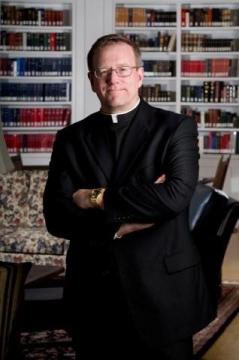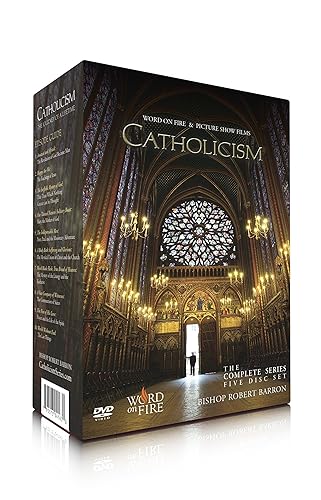I have an “uncorrected proof” of the book and a “rough-cut” of the DVD series; both are titled Catholicism, but they have different subtitles: A Journey to the Heart of the Faith and The Journey of a Lifetime. Take your pick; each is true.
The chapters of the book follow – and in some cases amplify – the episodes in the video series. In its ten chapters, the book includes over 100 images of, as author Robert E. Barron aptly describes it in his introduction, “The Catholic Thing.” The ten one-hour DVD episodes, narrated by Fr. Barron, have approximately a zillion images: all of them moving – and you can take that in several senses of the word: active, poignant, stirring.
So what is this thing, Catholicism (speaking now principally of the DVDs)? Simply the most vivid catechism ever created; a high-def illustrated manuscript for the twenty-first century; the best-ever film about the Catholic faith.
The early episodes could have been titled Mere Catholicism. Fr. Barron starts with Jesus (“Yahweh moving among his people”), and what he says about the Lord would find concert with most Christians. This, for instance, with regard to the Incarnation:
The church fathers never tired of repeating this phrase . . . Deus fit homo ut homo fieret Deus (God became human so that humans might become God). . . . We are called not simply to moral perfection or artistic self-expression or economic liberation but to what the Eastern fathers called theosis, transformation into God.
He often bolsters his presentation with quotes from Protestant authors: C.S. Lewis, N.T. Wright, and Paul Tillich among them. You get no histrionic preaching from Fr. Barron, which is not to say his narration isn’t enlivened by passion for Jesus Christ. It is, but he mostly lets Jesus, the saints, the Church, and the scenery illumine the emotional power of Catholicism. All films (and some books) are collaborative endeavors, and director Matt Leonard, cinematographer John Cummings, and composer Steve Mullen have created a stunningly lyrical audio-visual backdrop to the words of the globetrotting Fr. Barron.
I can’t tell you how many times I’ve watched a Catholic film or TV program and commented, “Surely we can do better than this!” Well, Catholicism is better than I ever imagined such a film could be – a feast for eye and ear and soul.
Many documentarians – if not devoted to the cinema-vérité style – employ interviews with experts, sometimes with great success, as in Ken Burns’ The Civil War and Baseball. Catholicism more evokes Kenneth Clark’s Civilization (1969) and Jacob Bronowski’s The Ascent of Man (1973). Each is what Bronowski called “a personal view.” But the opinions of the great art historian and the world’s leading bio-mathematician, though elegant and authoritative, were nonetheless subject to much criticism.
I’ve no doubt Fr. Barron will be attacked alike by progressives and traditionalists (you can’t please everybody, least of all those who believe the pope should be a woman or who think we haven’t had a pope since 1914), but the fact is Catholicism is magisterial – and, again, you can take that word in several senses: authoritative, canonical, masterful.
Catholicism does not directly address the various controversies roiling the twenty-first-century Church, and at first I wanted to be surprised by this, having previously watched Fr. Barron’s superb Word On Fire video broadsides against some aspects of popular culture (including pseudo-Catholicism). But having watched the whole Catholicism series it makes sense that he would stay above the fray.

Fr. Barron does, briefly and forcefully, address the sex-abuse crisis in his discussion of the Four Marks of the Church (holy), but the intent of Catholicism is to offer a remedy to Fulton Sheen’s famous remark: “Not one hundred in the United States hate the Roman Catholic Church, but millions hate what they mistakenly think that the Roman Catholic Church is.” So now they’ll know.
If Catholicism is “orthodox” in its presentation of doctrine, Fr. Barron’s choices about how and through whom to illustrate the faith are very personal and include some surprises. He briefly quotes the great René Girard on mimetic desire and dwells at some length on Thomas Merton’s The Seven Storey Mountain. He gives special attention to Peter Maurin, Dorothy Day, and the Catholic Worker movement, and I think it’s not wrong to say that Fr. Barron, though a man of great intellect whose attention is often focused on evangelization and exegesis, nonetheless believes the Church best glorifies Christ by heeding His words in the twenty-fifth chapter of Matthew: by ministering to the hungry, the thirsty, the homeless, the sick, the lost.
Most aspects of Catholic doctrine and high points in Church history are touched upon, but even in ten hours Catholicism is too big a story to cover completely. Still, Fr. Barron provides the best possible summary of the Church’s point and purpose: making saints. His respectful portraits of Katherine Drexel, Thérèse of Lisieux, Edith Stein, and Mother Teresa of Calcutta do not spare details about their crises of faith, yet make clear each woman is a saint (or Blessed), and why.
Galilee and Rome, Lourdes and Auschwitz, Darjeeling and Manhattan: all these places have meaning for Catholics: for priests and nuns, artists and working people, who read Peter and Paul, Augustine and Aquinas, John Paul II and Benedict XVI, and who marvel at St. Peter’s, Notre Dame, Our Lady of Guadalupe, and St. Patrick’s.
“To hear the echo of God’s voice in all these things,” Fr. Barron writes, “is to be a Catholic.”
No brief review can do justice to the breadth and beauty of Catholicism. It will be an essential catechetical tool from now on. It will lead to conversions and bring lapsed Catholics back to the Church. All the years of labor by the project’s team have paid off in triumph. The Spirit is at work here.
















